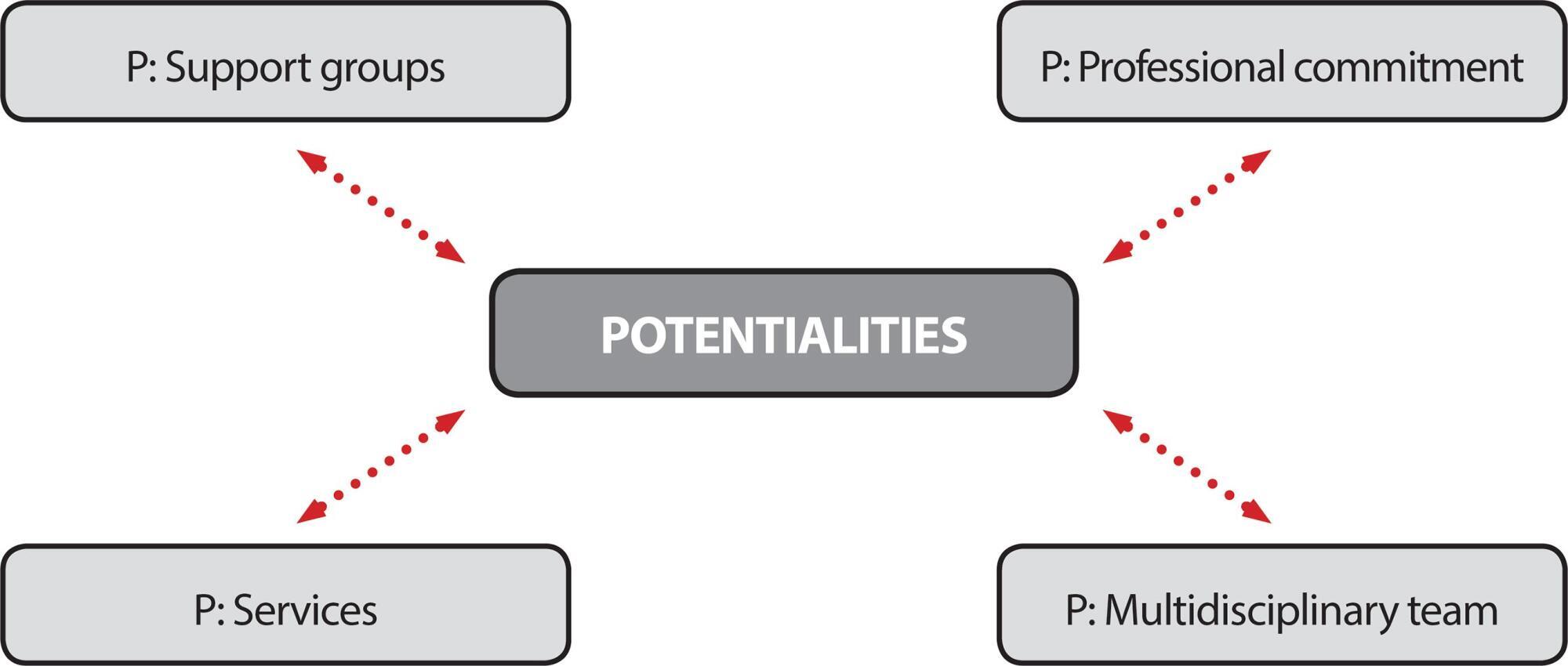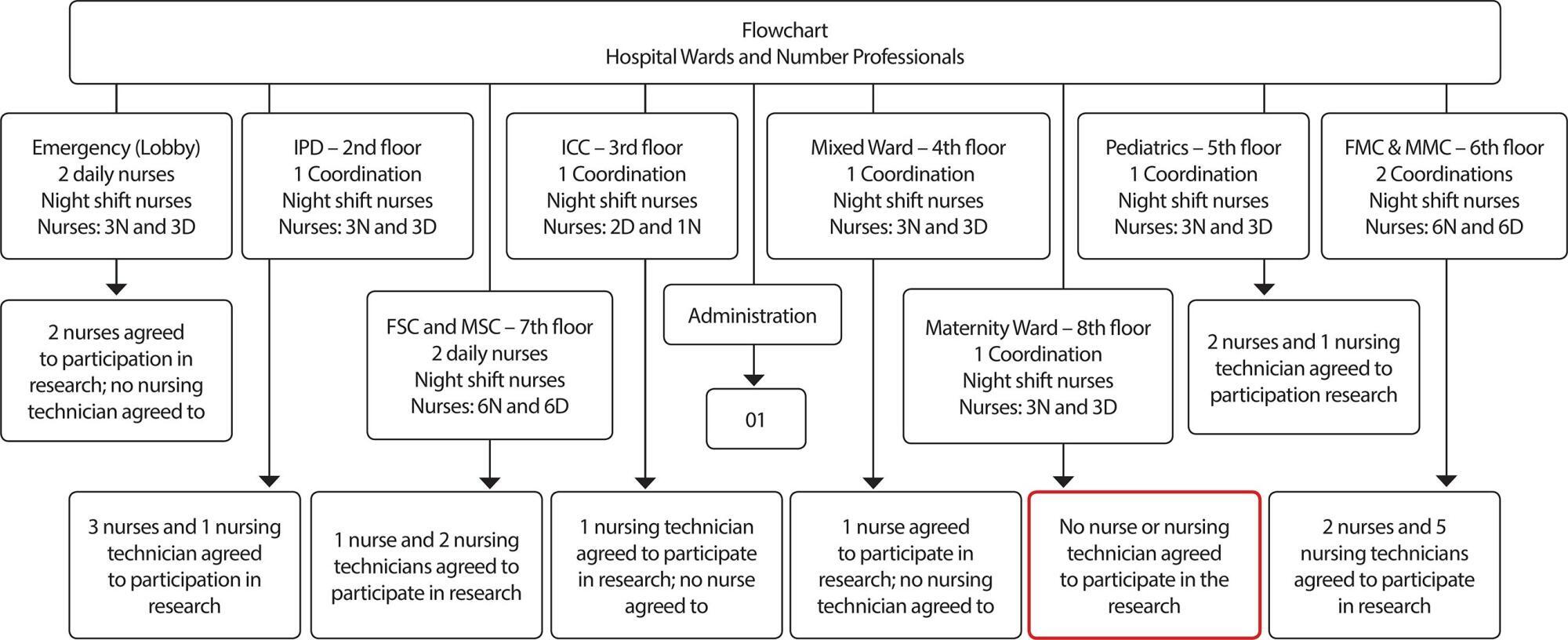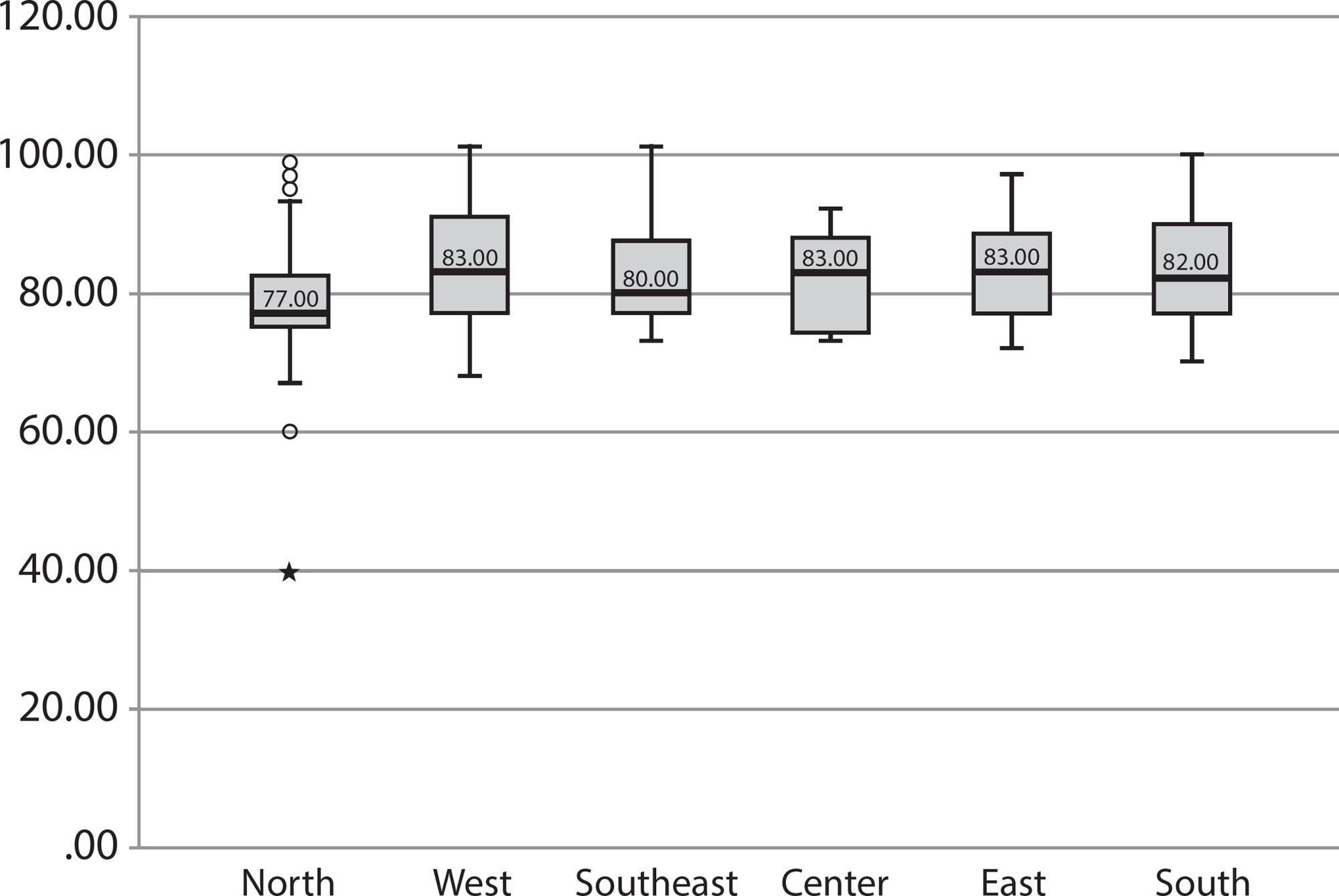-
ORIGINAL ARTICLE07-15-2024
Depressive symptoms and associated factors among travestis and transsexuals: a cross-sectional study
Revista Brasileira de Enfermagem. 2024;77:e20230071
Abstract
ORIGINAL ARTICLEDepressive symptoms and associated factors among travestis and transsexuals: a cross-sectional study
Revista Brasileira de Enfermagem. 2024;77:e20230071
DOI 10.1590/0034-7167-2023-0071
Views0See moreABSTRACT
Objectives:
to estimate the prevalence of depressive levels and their associated factors among transvestite and transsexual individuals.
Methods:
this cross-sectional study involved 58 participants assisted by non-governmental organizations. The Beck Depression Inventory was utilized to assess levels of depression, complemented by a sociodemographic questionnaire and a questionnaire on experiences of violence. Data were analyzed using descriptive statistics and Poisson regression with robust variance.
Results:
a prevalence of 27.6% (95% CI = 11.50-39.10) for moderate to severe levels of depression was observed. This prevalence was associated with being unmarried (PR = 1.19; 95% CI = 1.10-1.28) and experiencing violence in healthcare services (PR = 2.30; 95% CI = 1.10-4.81).
Conclusions:
the absence of a partner and experiences of violence in healthcare settings negatively impacted mental health, leading to an increased prevalence of depressive symptoms among transvestite and transsexual individuals. Advocating for transgender rights and providing ongoing education in health care for professionals are critical strategies in promoting the mental health of this population.
-
07-15-2024
Invisibilidade do trabalho da enfermagem: tecnologia como via de combate
Revista Brasileira de Enfermagem. 2024;77:e77suppl0301
Abstract
Invisibilidade do trabalho da enfermagem: tecnologia como via de combate
Revista Brasileira de Enfermagem. 2024;77:e77suppl0301
DOI 10.1590/0034-7167.202477suppl0301pt
Views0Na concepção comum, o trabalho é comumente associado a uma atividade remunerada em uma sociedade mercantil e de direito, refletindo a visão moderna que o limita ao tempo trocado por salário. Essa perspectiva, influenciada pelos princípios da Revolução Industrial, estabelece uma dicotomia entre o trabalho e o tempo fora dele, segmentando a vida em esferas […]See more -
07-08-2024
Can nursing contribute to reducing mortality from land transport accidents?
Revista Brasileira de Enfermagem. 2024;77(4):e770401
Abstract
Can nursing contribute to reducing mortality from land transport accidents?
Revista Brasileira de Enfermagem. 2024;77(4):e770401
DOI 10.1590/0034-7167.2024770401
Views0Morbidity and mortality from external causes, especially those resulting from land transport accidents (LTA), persist as a global challenge, given that they account for around 2 million lives lost annually, impacting various segments of society, especially in health services and systems().Evidence indicates that LTA are preventable, although historically they have been considered inevitable. However, isolated […]See more -
07-08-2024
¿Puede la enfermería contribuir a reducir la mortalidad por accidentes de transporte terrestre?
Revista Brasileira de Enfermagem. 2024;77(4):e770401
Abstract
¿Puede la enfermería contribuir a reducir la mortalidad por accidentes de transporte terrestre?
Revista Brasileira de Enfermagem. 2024;77(4):e770401
DOI 10.1590/0034-7167.2024770401es
Views0La morbilidad y la mortalidad por causas externas, especialmente las resultantes de accidentes de transporte terrestre (ATT), persisten como un desafío global, dado que es responsable de alrededor de 2 millones de vidas perdidas anualmente, impactando a diversos segmentos de la sociedad, especialmente en los servicios y sistemas de salud().La evidencia indica que los ATT […]See more -
ORIGINAL ARTICLE06-28-2024
Nursing leadership strategies in addressing COVID-19 in light of John Kotter’s framework
Revista Brasileira de Enfermagem. 2024;77:e20230289
Abstract
ORIGINAL ARTICLENursing leadership strategies in addressing COVID-19 in light of John Kotter’s framework
Revista Brasileira de Enfermagem. 2024;77:e20230289
DOI 10.1590/0034-7167-2023-0289
Views0See moreABSTRACT
Objective:
To analyze the leadership strategies of nurses in university hospitals in response to care management changes during the COVID-19 pandemic, informed by John Kotter’s insights.
Methods:
This multicentric study utilized qualitative and analytical methods. It was conducted through semi-structured interviews with 139 lead nurses from 10 university hospitals in Brazil. Data analysis included Bardin’s content analysis and the webQDA software.
Results:
The primary category identified was “Nursing Leadership Strategies in the Battle Against COVID-19,” encompassing five subcategories. This category underscored the importance of strategic vision in nursing leadership for combating COVID-19 within hospital settings, as well as the necessity of working collaboratively with their teams and other healthcare professionals.
Final Considerations:
The results highlight the strategies used by lead nurses in confronting COVID-19, which can be associated with John Kotter’s theoretical framework and his model of change.
-
ORIGINAL ARTICLE06-28-2024
Palliative Care for SARS-CoV-2 Patients in the Intensive Care Unit: A Comprehensive Study
Revista Brasileira de Enfermagem. 2024;77:e20230218
Abstract
ORIGINAL ARTICLEPalliative Care for SARS-CoV-2 Patients in the Intensive Care Unit: A Comprehensive Study
Revista Brasileira de Enfermagem. 2024;77:e20230218
DOI 10.1590/0034-7167-2023-0218
Views0See moreABSTRACT
Objective:
To comprehend the multiprofessional actions regarding palliative care for patients in the Intensive Care Unit affected by SARS-CoV-2.
Methods:
A comprehensive qualitative study conducted with 31 professionals from the Intensive Care Units of a university hospital, based on the Theory of Peaceful End of Life.
Results:
The analysis of the discourse led to the identification of two categories: “Multidisciplinary actions to promote comfort at the end of life” and “Palliative care during the pandemic period and the promotion of emotional and spiritual comfort.”
Final Considerations:
It became evident that local administration needs to invest in measures that reduce barriers to the implementation of palliative care during times of crisis. Understanding the discourse highlighted that non-specialized professionals can provide basic palliative care appropriately, without diminishing the importance and necessity of the presence of palliative care specialists in various hospital areas.

-
ORIGINAL ARTICLE06-28-2024
Quality of life at work for health professionals during the COVID-19 pandemic
Revista Brasileira de Enfermagem. 2024;77:e20230461
Abstract
ORIGINAL ARTICLEQuality of life at work for health professionals during the COVID-19 pandemic
Revista Brasileira de Enfermagem. 2024;77:e20230461
DOI 10.1590/0034-7167-2023-0461
Views0See moreABSTRACT
Objective:
to evaluate the quality of life at work of health professionals in direct and indirect care of COVID-19 cases.
Methods:
this was a cross-sectional study with 156 health professionals from a referral hospital. The relationship between sociodemographic and work-related variables and perceived stress and domains of the Quality of Life at Work Scale was investigated using inferential statistics and regression.
Results:
Satisfaction with Compassion was moderate (mean: 38.2), with low perception of stress, Burnout and Secondary Traumatic Stress (means: 18.8, 21.6 and 19.1). There were associations between: education, salary, multiple jobs and direct care with Compassion Satisfaction; low income, being a nurse and working overtime with Burnout; and working more than 12 hours, underlying disease and hospitalization for COVID-19 with Secondary Traumatic Stress.
Conclusion:
quality of life at work was satisfactory, despite the presence of Burnout and Secondary Traumatic Stress.
-
ORIGINAL ARTICLE06-28-2024
Uncertainties experienced by nursing professionals who contracted Covid-19: a priori, everyone is human
Revista Brasileira de Enfermagem. 2024;77:e20230142
Abstract
ORIGINAL ARTICLEUncertainties experienced by nursing professionals who contracted Covid-19: a priori, everyone is human
Revista Brasileira de Enfermagem. 2024;77:e20230142
DOI 10.1590/0034-7167-2023-0142
Views0See moreABSTRACT
Objective:
To analyze the uncertainties experienced by nursing professionals who contracted COVID-19.
Methods:
This qualitative research was conducted with 20 nursing professionals who fell ill from COVID-19. Data collection was carried out through semi-structured interviews; the data were then organized using thematic analysis and discussed in the context of Merle Mishel’s Reconceptualized of Uncertainty in Illness Theory.
Results:
The antecedents of the disease had a strong influence on how nursing professionals who contracted COVID-19 perceived uncertainty. The media coverage of the increasing number of cases, the collapse of the healthcare system, and the high mortality rate contributed to associating the disease with fear and panic.
Final Considerations:
Viewing it from the perspective of the disease’s antecedents, the illness of a nursing professional from COVID-19 underscores that before being professionals, they are human beings just like anyone else, undergoing adversities and facing the possibilities associated with being ill.
-
REVIEW07-17-2020
Approaches to workload in psychiatric and mental health nursing
Revista Brasileira de Enfermagem. 2020;73:e20190620
Abstract
REVIEWApproaches to workload in psychiatric and mental health nursing
Revista Brasileira de Enfermagem. 2020;73:e20190620
DOI 10.1590/0034-7167-2019-0620
Views0See moreABSTRACT
Objective:
to investigate approaches to workload in psychiatric and mental health nursing in Brazilian and international production of knowledge
Methods:
integrative literature review using six databases, covering January 2005 to March 2019. Articles in full in English, Spanish and Portuguese were included.
Results:
the sample consisted of 23 original articles classified as quantitative or emotional. The quantitative dimension was addressed in 12 articles and included: assessing patient care needs, identifying activities performed by the team, measuring time spent and developing and validating a measurement instrument. The emotional dimension included 11 articles the focus of which was on identifying stressors in the workplace, psychosocial risks and coping strategies.
Conclusion:
strategies were found for measuring workload and assessing the impact of stressors on nursing teams.
-
ORIGINAL ARTICLE05-18-2020
Women in situations of sexual violence: potentialities and weaknesses of the intersectoral network
Revista Brasileira de Enfermagem. 2020;73(4):e20190856
Abstract
ORIGINAL ARTICLEWomen in situations of sexual violence: potentialities and weaknesses of the intersectoral network
Revista Brasileira de Enfermagem. 2020;73(4):e20190856
DOI 10.1590/0034-7167-2018-0856
Views0See moreABSTRACT
Objectives:
to identify potentialities and weaknesses of the intersectoral network for women in situations of sexual violence, from the perspective of Intervention Bioethics and the Universal Declaration on Bioethics and Human Rights.
Methods:
qualitative study conducted with multidisciplinary team members who work in intersectoral care services for women subject to sexual violence. It was held in a municipality in southern Brazil. An intentional sample, totaling 30 professionals. Semi-structured interview was used from January to April 2016. Interviews were analyzed by Thematic Analysis.
Results:
two categories emerged: potentialities and weaknesses related to the intersectoral network. Potentialities confirm the importance of the articulated intersectoral network; weaknesses such as lack of organized flow and disarticulation of services result in women revictimization and care fragmentation.
Final Considerations:
it is necessary to articulate services and qualify professionals. The Intervention Bioethics and the Universal Declaration on Bioethics and Human Rights foster discussions that contribute to how to organize and sustain the intersectoral network.

-
ORIGINAL ARTICLE07-10-2020
Mental Health Nursing: waiting room intervention in integral health care
Revista Brasileira de Enfermagem. 2020;73:e20180886
Abstract
ORIGINAL ARTICLEMental Health Nursing: waiting room intervention in integral health care
Revista Brasileira de Enfermagem. 2020;73:e20180886
DOI 10.1590/0034-7167-2018-0886
Views0See moreABSTRACT
Objective:
To describe and to analyze the proposal for intervention in the waiting room as a possibility for Nursing in mental health in group context.
Method:
Descriptive study with a qualitative approach, convergent care type, developed in a Psychosocial Care Center for Alcohol and Drugs in the interior of the state of Goiás.
Results:
The service in the waiting room provided moments of reflection, knowledge, learning, listening and exchanging experiences.
Final considerations:
The meetings in the waiting room favored the articulation between theoretical knowledge and the practice of nursing care in groups, constituting a space with a valuable locus for the development of educational and support actions in health services, to be undertaken by the nurse and, also, by other professionals of the health team.
-
ORIGINAL ARTICLE08-10-2020
Risk management in the scope of nursing professionals in the hospital setting
Revista Brasileira de Enfermagem. 2020;73(6):e20190303
Abstract
ORIGINAL ARTICLERisk management in the scope of nursing professionals in the hospital setting
Revista Brasileira de Enfermagem. 2020;73(6):e20190303
DOI 10.1590/0034-7167-2019-0303
Views1See moreABSTRACT
Objective:
To evaluate occupational hazards affecting nursing professionals’ health in the environment of the hospital.
Method:
Descriptive-exploratory research with a qualitative approach.
Results:
The main hazards affecting nursing professionals were work overload due to the large number of patients or the small number of professionals, inadequate infrastructure, and insufficient organizational management. It became evident the work interferences in the nursing professional’s life are enormous. Despite the existence of health occupational risk management, there is still a shortage of bigger endeavors to be employed in the hospital routine. As a main result of the study, a Standard Operational Protocol (SOP) for biological risk was created to be applied in a hospital setting.
Conclusion:
Based on the identification of occupational hazards, it was suggested the Standard Operational Protocol which should be standardized to manage biological occupational hazards, to ensure the adequate flow of procedures after the exposure, as well as the occupational safety of nursing professionals.

-
ORIGINAL ARTICLE07-06-2020
Time and quality of admissions: nursing workload
Revista Brasileira de Enfermagem. 2020;73(5):e20190267
Abstract
ORIGINAL ARTICLETime and quality of admissions: nursing workload
Revista Brasileira de Enfermagem. 2020;73(5):e20190267
DOI 10.1590/0034-7167-2019-0267
Views0See moreABSTRACT
Objectives:
to measure the average time spent by the nursing staff during patient admission and investigate their compliance with the activities described by the Nursing Interventions Classification; evaluate the degree of interference in the workload of the team.
Methods:
observational with time measurement through software. We followed 199 admissions made by the nursing staff in seven units, using two validated instruments. Total scores ≥ 70% and 50% validated the process.
Results:
the average time of nurses ranged from 5.5 (standard deviation = 2.3) to 13 (standard deviation = 1.1) minutes; and the auxiliary / technician, between 4.7 (standard deviation = 2.1) and 6.8 (standard deviation = 2.0) minutes (p ≤ 0.01). We qualified six admissions made by nurses and 33 by assistants/technicians. The intervention spent 16.3% to 31.5% of the working hours of the team.
Conclusions:
admission impacts nursing workload and needs to be considered both in the measurement of activities and in the sizing of the nursing staff.
-
ORIGINAL ARTICLE09-21-2020
Nurses’ attitudes facing the family involvment in caring for people with mental disorder
Revista Brasileira de Enfermagem. 2020;73:e20200041
Abstract
ORIGINAL ARTICLENurses’ attitudes facing the family involvment in caring for people with mental disorder
Revista Brasileira de Enfermagem. 2020;73:e20200041
DOI 10.1590/0034-7167-2020-0041
Views0See moreABSTRACT
Objective:
To characterize the attitudes of Primary Health Care nurses, regarding the involvement of the family in the care for people with Mental Disorder.
Methods:
Correlational study with 257 nurses from the city of São Paulo. The scale “Importance of Families in Nursing Care- Nurses’ Attitudes” was used. For the analysis, descriptive and inferential statistics were used.
Results:
The scale scores were high, with a mean value of 82.1 (SD=8.4) favorable to the families’ involvement, and are related to being a nurse in the Family Health Strategy (p<0.001), having received education/training in family nursing (p<0.005), the workload of 40 hours/week (p<0.005), working in the West, East and Center Regions (p<0.005).
Conclusion:
Most nurses have positive attitudes towards the involvement of families, a relevant indicator for their inclusion in the health-mental care process.

-
07-09-2021
Algorithm for transitional care for caregivers of dependent older adults: a validation study
Revista Brasileira de Enfermagem. 2021;74:e20200625
Abstract
Algorithm for transitional care for caregivers of dependent older adults: a validation study
Revista Brasileira de Enfermagem. 2021;74:e20200625
DOI 10.1590/0034-7167-2020-0625
Views0See moreABSTRACT
Objective:
To construct and validate an algorithm for transitional care for caregivers of dependent older adults.
Method:
This was a methodological study developed in three phases: a literature review, designing an algorithm, and its validation by a peer panel with twenty-seven experts selected according to pre-defined inclusion criteria.
Results:
The algorithm predicted interventions in transitional care (hospital stay, at discharge, and 30 days at home post-discharge) aimed at the exercise of the caregiver role; needs assessment; training in care management of dependent older adults and management of self-care, and ensuring continuity of care (of older adults and caregivers).
Conclusion:
Agreement between expert raters and a reliability test of 0.92 indicate that the algorithm can be used by professionals to decide the transitional care interventions to be administered to the caregivers of dependent older adults. Future studies should be conducted to perform its clinical validation.

-
REVIEW07-14-2021
Stress level experienced by participants in realistic simulation: a systematic review
Revista Brasileira de Enfermagem. 2021;74(4):e20201151
Abstract
REVIEWStress level experienced by participants in realistic simulation: a systematic review
Revista Brasileira de Enfermagem. 2021;74(4):e20201151
DOI 10.1590/0034-7167-2020-1151
Views0See moreABSTRACT
Objectives:
to identify the available evidence regarding stress levels experienced by participants in education based on a realistic simulation.
Methods:
systematic review that included randomized clinic trials on electronic databases: Cumulative Index to Nursing and Allied Health Literature, Cochrane Library, Latin-American and Caribbean Literature in Health Sciences, LIVIVO, PubMed, Scopus, and Web of Science. The additional search was performed on Google Scholar and OpenGrey. All searches occurred on September 24, 2020. The methodologic quality of the results was evaluated by the Cochrane Collaboration Risk of Bias Tool.
Results:
eighteen studies were included, which evaluated the participants’ stress using physiologic, self-reported measures, or the combination of both. Stress as experienced in a high level in simulated scenarios.
Conclusions:
evidence of the study included in this systematic review suggest that stress is experienced in a high level in simulated scenarios.

Search
Search in:
Nuvem de Tags
Adolescente (85) Atenção Primária à Saúde (239) COVID-19 (91) Criança (91) Cuidados de Enfermagem (269) Educação em Enfermagem (151) Educação em Saúde (139) Enfermagem (930) Enfermagem Pediátrica (86) Estudantes de Enfermagem (77) Estudos de Validação (131) Família (87) Idoso (208) Promoção da Saúde (99) Qualidade de Vida (104) Saúde do Trabalhador (86) Saúde Mental (145) Saúde Pública (82) Segurança do Paciente (150) Tecnologia Educacional (100)



